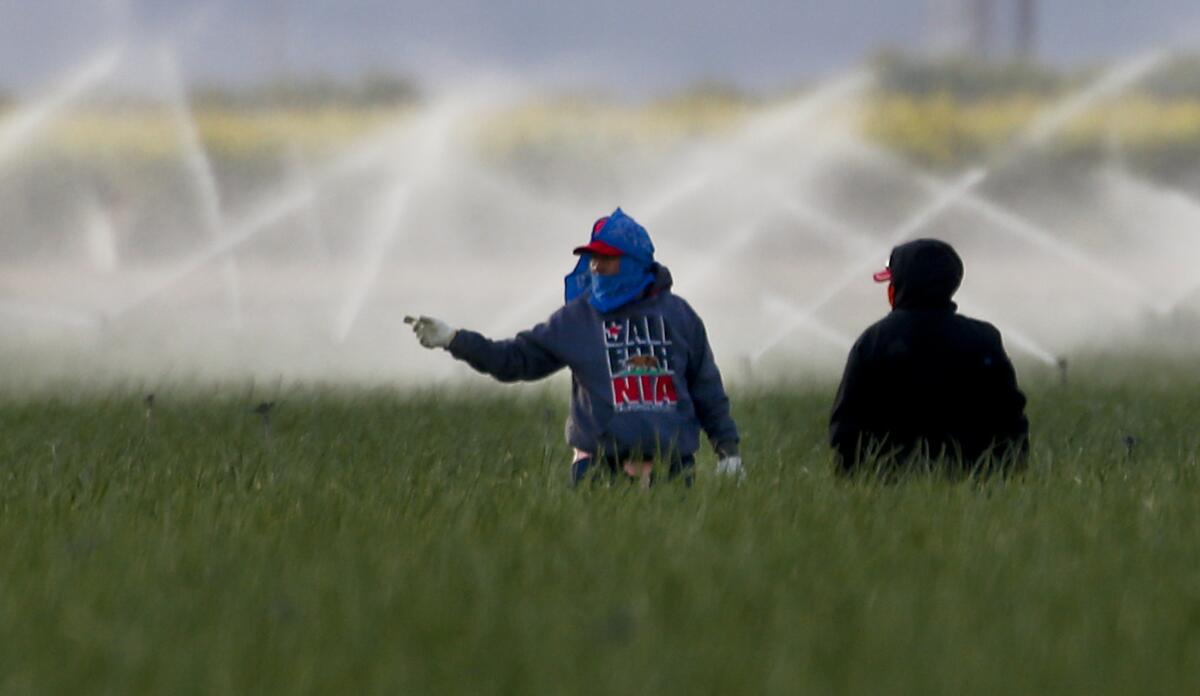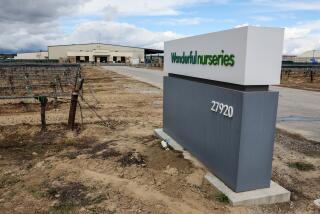Farm worker union activities are trespassing, rights group charges

Controversy has erupted over a farm worker education proposal by the state Agribultural Labor Relations Board that would allow access to grower properties.
A proposal by the state’s farm labor watchdog to go out into fields to tell farmworkers about their rights is running into strong opposition from growers, who fear that the agency is about to mix policing with education.
The Pacific Legal Foundation, a conservative land rights group, fired a shot over the bow of the Agricultural Labor Relations Board on Wednesday by filing a broad constitutional challenge to a 40-year-old regulation that gives unions limited access to private property so they can meet with workers.
The challenge was filed in U.S. District Court in Fresno on behalf of a Central Valley packer and Northern California plant nursery that have been the target of unionization efforts by the United Farm Workers. It does not directly address the labor board’s education proposal, which hasn’t even been written.
“We’re not objecting to the ALRB staff coming onto the property; we don’t have a problem with that,” said Damien Schiff, the foundation’s lead attorney for the lawsuit. “We have a problem with private parties — in this case, union representatives — coming onto their property.”
But Schiff acknowledged that the labor board had “relied upon the existing access regulation that we’re challenging in this lawsuit” to justify expanding its role into field-level education of workers.
“The board’s attorney says, ‘Well, you know: we’re already doing it with respect to union access, the California Supreme Court has upheld that, so that’s the reason why we can go ahead and expand this access regulation to allow our own staff to come onto the property to educate employees,’” Schiff said.
William B. Gould IV, chairman of the three-member labor board, said the suit could be “a preemptive strike” against the board’s impending move into educational outreach, as well as an attempt to bring a case before a conservative U.S. Supreme Court that appears willing to rule in favor of private property rights.
The question of union access to private property has largely been settled, said Gould, a Gov. Jerry Brown appointee who is an emeritus law professor at Stanford University and previously chaired the National Labor Relations Board.
“The U.S. and California Supreme Courts have established the principle that individuals other than employees and the employers themselves may have access for the purpose of labor statutes,” Gould said. “This is a well-established concept that goes back well into the previous century.”
Gould said the board’s future education plan would not offer unions a new way to get onto growers’ property. Unions such as the UFW have “all kinds of ways under existing law to get access,” he said.
Public hearings held by the labor board in September unearthed deep misgivings among growers over whether the board can adequately “firewall” its investigative branch from any future education role.
“I think that is a legitimate concern, and it’s something we want to make sure is addressed in the final rule,” Gould said.
The board was created to oversee union elections and investigate allegations of unfair labor practices at a time when farmworkers were not covered by federal labor laws. But amid a drop in union election activity, it has spent much more time on “concerted activity” cases, where workers unaffiliated with unions spontaneously protest conditions or request information about rights, Gould said.
That, along with a rise in the number of workers who speak indigenous languages, has spurred the board to embark on educational outreach, once considered the exclusive purview of unions.
Even if the board finalizes its educational access rule, it would face a lack of staff who speak indigenous languages. It also will have to navigate a conundrum, Gould noted: “How will the workers make a request if they don’t know to begin with?”
Twitter: @LATgeoffmohan
ALSO
$475 million deal reflects Playa Vista’s rise as tech hub
Salinas hopes to turn farm workers’ children into computer scientists
Who’s the driver of that Google car? Feds ready to say it’s the computer







